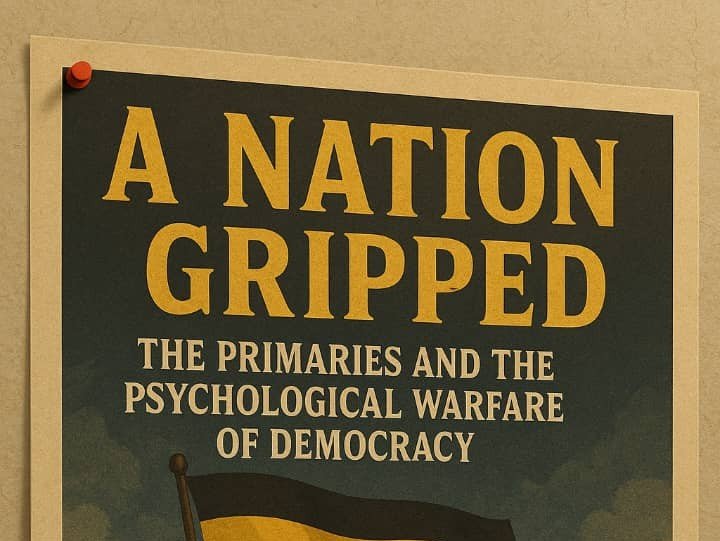By Isaac Christopher Lubogo
I. Introduction: The Dance Before the War
There is something eerily theatrical—almost biblical—in the air. Uganda is not merely watching the NRM primaries; she is living them. From dusty trading centers to Twitter hashtags, from gossip on boda stages to whispered fears at dining tables, the country has been set ablaze—not by policy or ideology—but by primaries, those prelude rituals to power that now rival even national elections in drama and emotional expenditure.
Kudos to the NRM indeed. For in a nation that routinely accuses it of stagnation, it has paradoxically animated the nation into political motion. Love them or loathe them, the NRM has managed, once again, to seize the soul of the nation and hold it in suspense—like an unfinished novel whose ending everyone thinks they know, but no one can predict.
II. The Tyranny of Hope: When Primaries Imitate Elections
Hope is a beautiful liar. It smiles at peasants and tycoons alike, promising renewal, opportunity, and elevation. But hope can also hurt—especially in politics. In the NRM primaries, every hand that waves in the village, every truck that blares campaign songs, every handshake and T-shirt, carries the weight of someone’s dream. For many, it is not just a primary; it is the election.
Yet therein lies the cruelty. The primaries stir a volcanic excitement, but they are structurally deceptive. Most of the electorate forgets—or chooses to forget—that these contests are intra-party, not national decisions. But because the ruling party has become synonymous with the state, the line blurs. The winner of the primaries is often assumed to be the inevitable MP or LCV or LC3. This illusion is both genius and dangerous. Genius for the NRM; dangerous for the republic.
III. The Passion, the Pain, and the Price of Participation
The electrifying thrill of the primaries masks a deeper psychological game. For weeks, entire communities suspend their usual rhythms. Marriages strain under the weight of political allegiances. Debts are taken. Pastors are bribed. Sorcerers consulted. Lies become slogans. Kinship fractures into polling factions. In this charged atmosphere, betrayal becomes inevitable. Spouses leak strategy. Friends secretly switch sides. Even village prophets choose silence—for every vision they speak might cost them a meal.
And when it is all done, when the yellow dust settles, comes the pain—the dashed hopes, the unreciprocated loyalty, the postponed dreams. It is a pain familiar to lovers, artists, and revolutionaries: the pain of misbelieving that effort guarantees success.
IV. The Philosophical Paradox of Democracy
The NRM primaries offer an opportunity for reflection on Uganda’s political soul. We claim to believe in democracy, yet we largely despise its unpredictability. We want fairness, but only if it delivers our candidate. We crave free choice, yet we panic at the possibility that the masses might choose the wrong person.
In this paradox, democracy becomes a mirror that does not flatter. It shows us that our leaders are not always imposed—we often elect our own despair.
V. Beyond NRM: When the Others Come to Play
Post-primaries, the real symphony begins. The NUPs, FDCs, DP remnants, independents, and outlier messiahs will enter the battlefield. But few can deny that the NRM primaries have already drawn the map and tempo of the national contest. Even opposition strongholds are abuzz—not because they respect the NRM, but because they recognize the tectonic force of its internal mechanisms.
The opposition, ironically, takes notes from the ruling party’s chaos. If imitation is the sincerest form of flattery, then Uganda’s multipartyism is one giant compliment to the dominance of yellow.
VI. Conclusion: A Nation Awaits the Rain
As we prepare for “the big one”—the national election—we must ask: what have we learned?
That democracy, even in its flawed forms, ignites passion? That hope is the nation’s most addictive narcotic? That political parties have become our new religions, with candidates as charismatic cult leaders?
Or perhaps the deeper truth is that Ugandans—young and old, rural and urban—still believe. They believe in change, in influence, in voice. Even when betrayed, they still line up. Even when rigged, they still hope. It is a resilience that borders on madness, yet is strangely noble.
Yes, the primaries are over. But the real test of a democracy is not in the voting—it is in how we rise from the disillusionment when the vote doesn’t go our way. That is when we’ll know whether Uganda is maturing—or merely rehearsing.
“The ballot, like the Bible, reveals not just what you believe—but who you are.”
— Isaac Christopher Lubogo
Let the next season begin. Let the drums roll again. Let us pray that the excitement births not just office-holders—but servants of the people.
# Suigeneris








